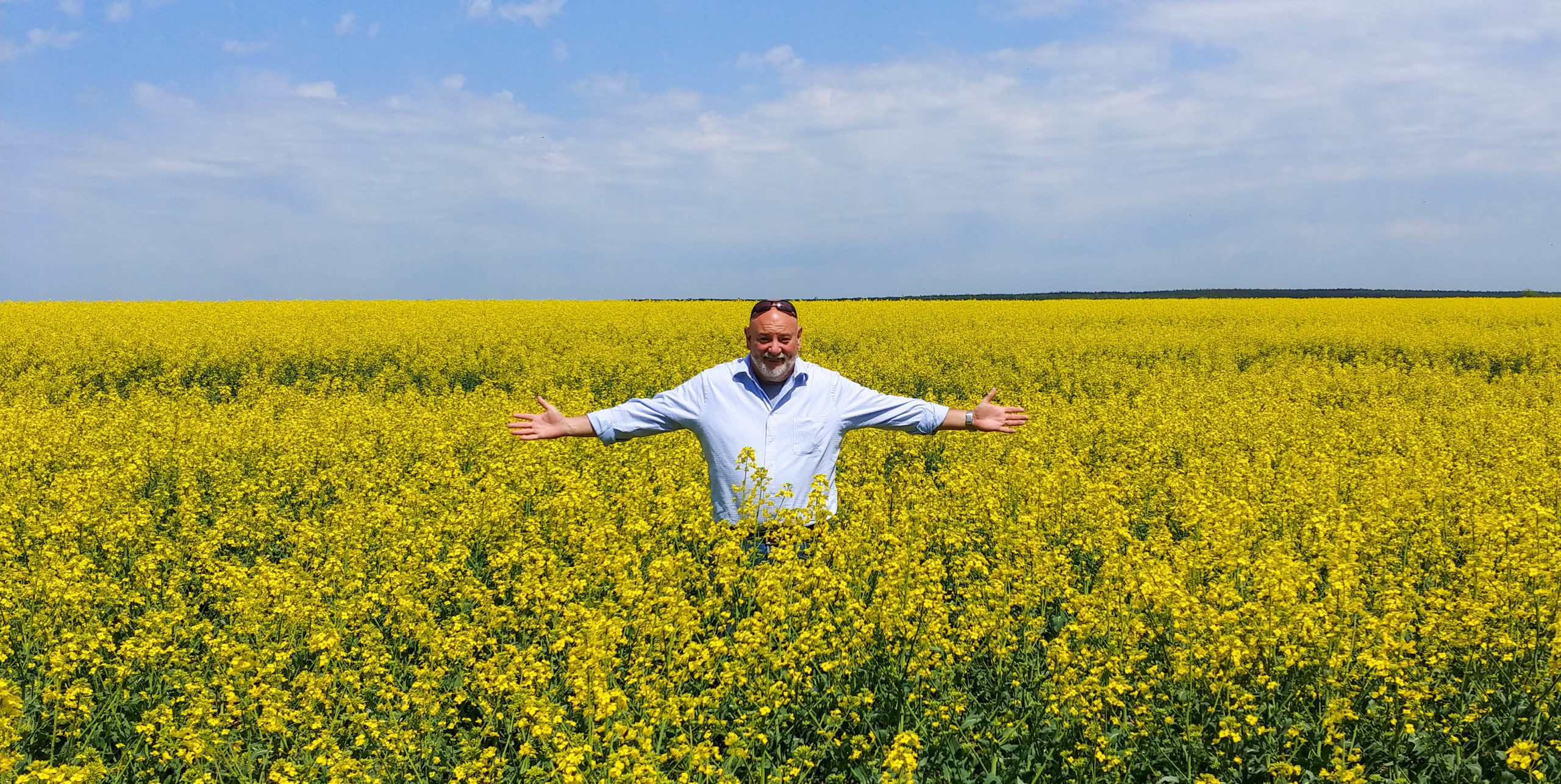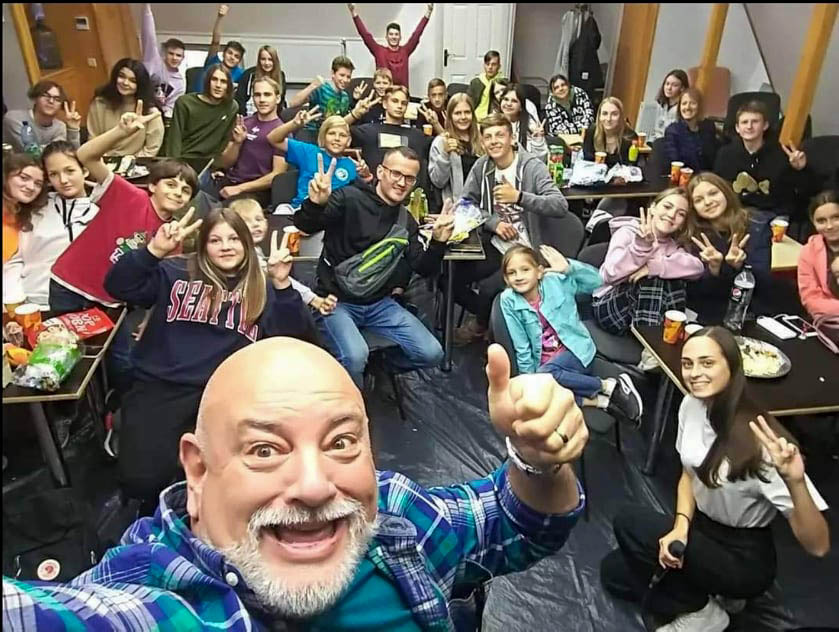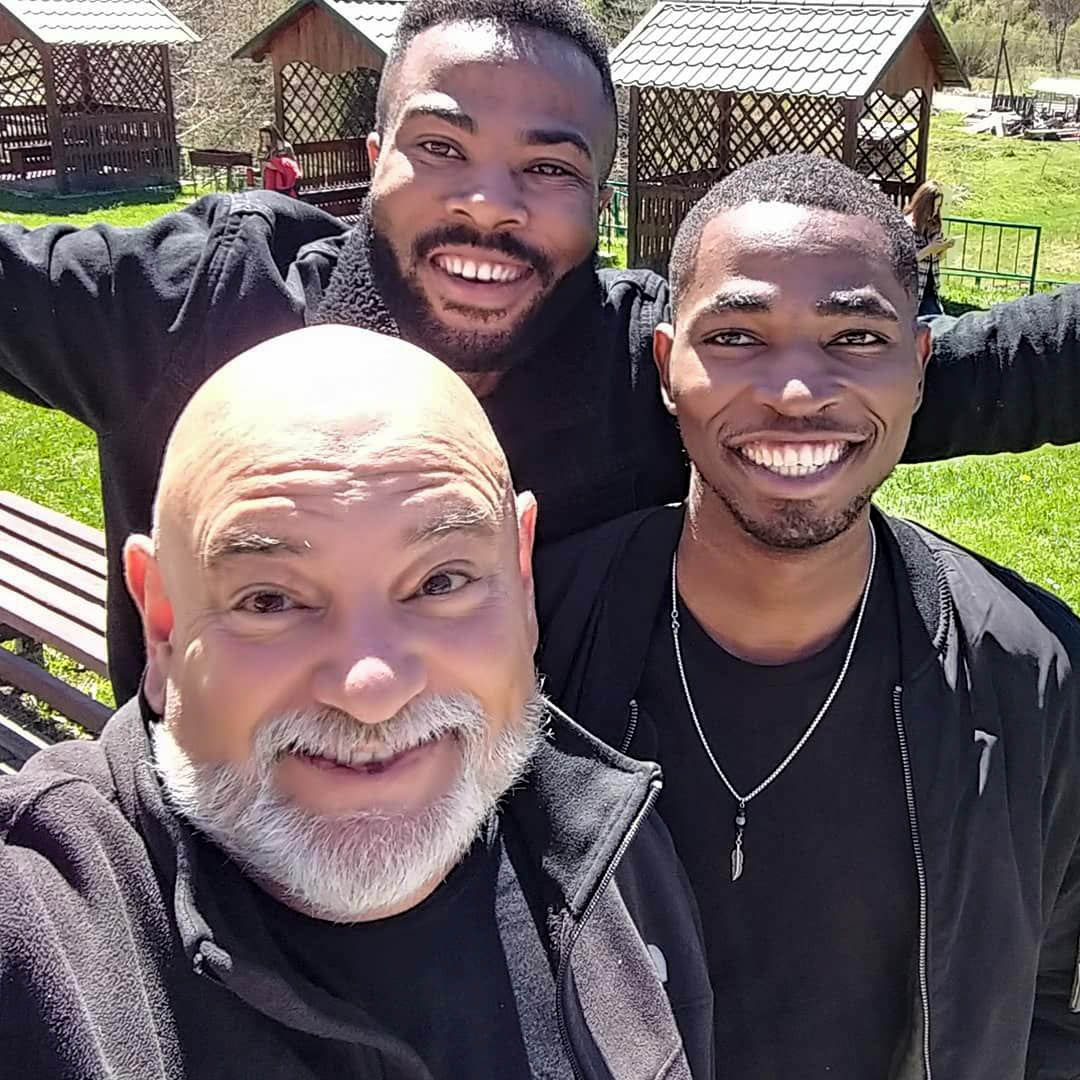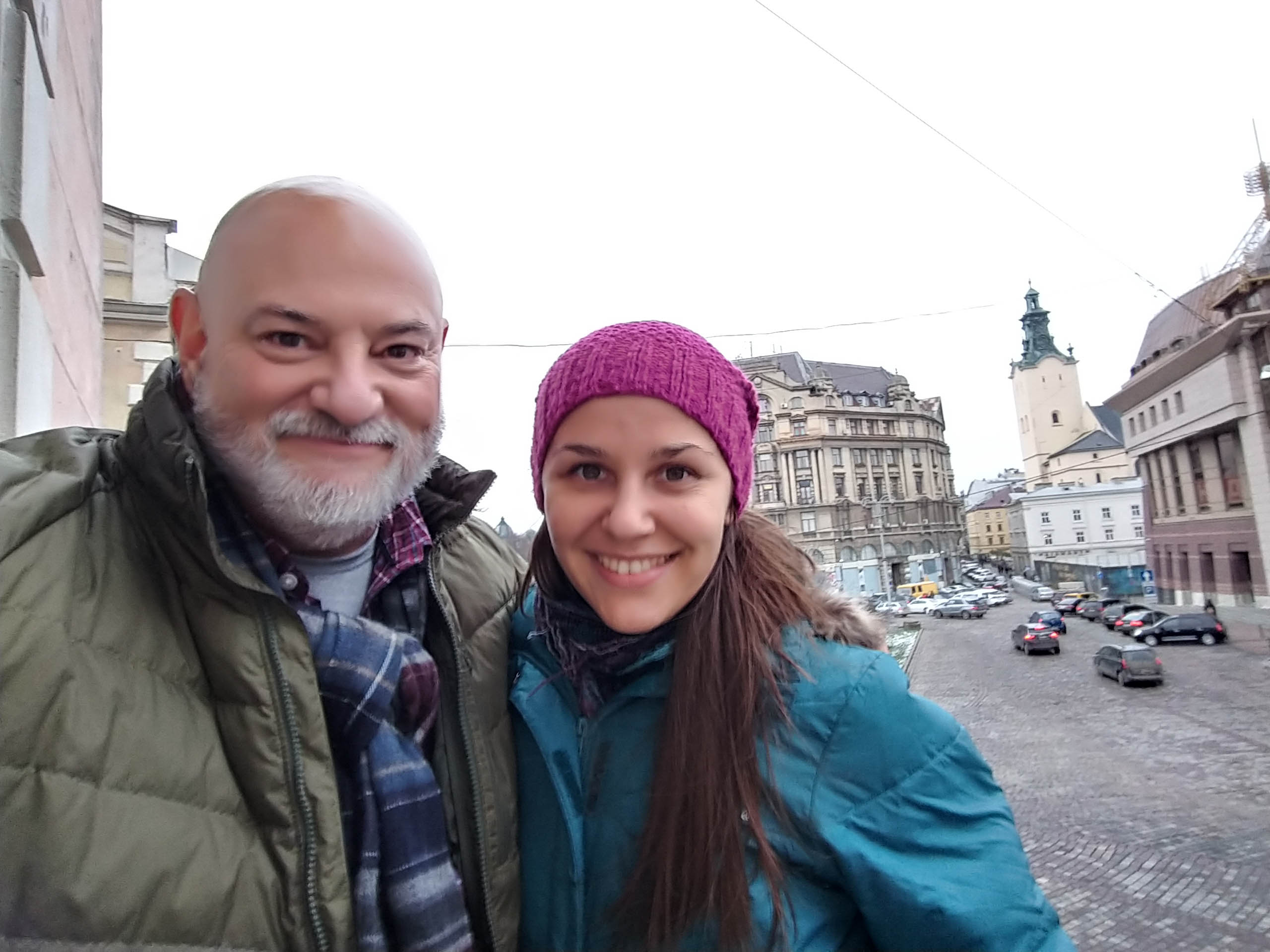As the war in Ukraine continues, Averett University alumnus Joel Butts ’83 watches and waits to hear from those his ministry, Twelve3One Ministries and Outreach Partners, works with daily inside the country.
 Twelve3One is an international ministry focused on partnering with other international ministries, churches, organizations, pastors and ministry leaders to help facilitate and expedite sharing the Gospel through their respective missions and ministries.
Twelve3One is an international ministry focused on partnering with other international ministries, churches, organizations, pastors and ministry leaders to help facilitate and expedite sharing the Gospel through their respective missions and ministries.
The purpose of the ministry, according to Butts, is to partner with those in Ukraine who are already doing work, get to know their goals and ask one simple question, “How can we help?”
Butts’ day generally begins by checking to be sure if his Ukrainian friends are still alive. For Butts, it could be a quick check on social media to see if there’s a green or purple badge by their names, a message to him or a comment on a post.
“It does me good to see that light by their names that lets me know they’ve been active online. It lets me know they’re alive,” Butts said. “I’m hearing from contacts in Ukraine every day, all day. Nothing makes me happier.”
Butts said it was his experiences at Averett that helped to prepare him for what he is doing today, especially with the many lessons from Averett faculty members like Maud Gatewood, Robert Marsh and Richard Gant.
“I have many ‘Maud-isms’ and I use them all the time. I remember her saying that it’s not necessarily what you learn in the classroom as it is what liberal arts can teach you about culture, communicating and how you interact with others. In that regard, I think Averett prepared me greatly,” Butts said. “Getting a degree says something about the person. The stick-to-itness that comes with staying with it. There’s so many distractions along the way as well. It showed me I can do the heavy lifting when I need to, and I can do anything else I put my mind to.”
That fortitude equipped him to know how to respond when the war in Ukraine began.
A Vision for Better Outreach
 For over 15 years, Butts has ministered to the Ukrainian people, along with his wife, Linda. He said he has never drawn a salary, and continues working with those in Ukraine because it’s a passion.
For over 15 years, Butts has ministered to the Ukrainian people, along with his wife, Linda. He said he has never drawn a salary, and continues working with those in Ukraine because it’s a passion.
It all started in 2006 when Butts volunteered with Worldwide Youth Camps (later known as YouthReach International), a group that shared the Bible with orphans during day events or at rest camps in Ukraine. For Butts, it didn’t take long to see their model wasn’t working.
“They would pack up a team of Americans and locals for interpreters to hold these Bible camps. In 2007, I noticed it’s good work they’re doing, and I made a comment to the leadership that it didn’t seem to be sustainable for what we were doing… packing up, connecting with a few like-minded adults who happened to speak English, and then holding these camps,” Butts said.
After interaction for just three weeks, Butts realized at the end of the camp period that everyone parted ways.
“The orphans went back to the orphanage, the Americans went home, and the Ukrainians went back to their home,” Butts said. “At the time we were working in Crimea, an autonomous state for Ukraine. I made a decision for my team that we would work in the orphanages, and take it to them where they were. At the time, I met another American who had founded a university in Simferopol. The university offered English as a major course of study. Nearly all the students we interacted with were first-generation Christians.”
Over time, American volunteers were thinned out and more Ukrainians were sought out because of their natural understanding of the culture and their ability to interact with children in their own native language. This made it possible to build and cultivate close relationships as those in Ukraine networked further.
“It’s all part of a discipleship model practiced by Jesus. He had 12 disciples, but he got close to three – Peter, James and John. However the Bible says Jesus loved one, John. We used that model to build strong relationships,” Butts said.
 Relationship-building was key to the ministry laying a firm foundation with the Ukrainian people. Butts said it could be as simple as going outdoors to play or taking them out for ice cream.
Relationship-building was key to the ministry laying a firm foundation with the Ukrainian people. Butts said it could be as simple as going outdoors to play or taking them out for ice cream.
“The goal was to build a relationship with them and to bring them to Christ,” Butts said.
But in 2014, the ministry work was interrupted when Russia annexed Crimea. Undeterred, Butts began searching for opportunities to rebuild the ministry in mainland Ukraine.
In 2015, the ministry settled on an area in the community of a close Ukrainian friend, Arthur Kazaryan. Butts said it was the contact with Kazaryan that helped get the ball rolling since they worked together in 2006.
“He helped us get from A to B, getting us where we needed, and he’s a great friend and brother who I can’t imagine doing any of this work without. We decided to work in his village. Kids there are what I would consider to be at risk. The lifestyle there is agrarian. Parents may, at times, have to go elsewhere to get another job, including going to Poland,” Butts said.
In 2018, Butts and his wife created Twelve3One. Later in 2019, after losing his full-time job, Butts decided to concentrate his efforts on the organization.
At this point, the ministry had taken shape in Ukraine, and Butts began making trips over to help further the work that was being done.
Then COVID-19 hit.
COVID-19 ravaged Eastern Europe. In the height of the pandemic in 2020, Butts began making regular trips to Ukraine to visit with friends and to explore other ministry opportunities and options. Along the way, Butts took two trips to Rivne and Berdychiv, cities within Ukraine, where he said he unexpectedly met the most extraordinary people who care deeply for their communities.
“There was a kickboxer there who was a Christian that had to quit due to injury, and he had a ministry teaching children self-defense and teaching them about God. I attended a Bible class one night where there were nearly 75-80 children in attendance,” Butts said.
Another small community ministry was that of a woman working off hot plates to prepare meals for children.
“I asked her to show me the kitchen, and there wasn’t one. She was preparing 20-25 meals on three hotplates, six days a week. Since the beginning of the war, she’s gone from 40-50 meals a day to now over 300 – still on those three hotplates. There are plans to expand, but those have been tabled until after the war,” Butts said. “All of this happened in one visit… I think that trip was full of revelation, and it brought our purpose and our mission together.”
With the war in full swing, Butts asks daily the central question of, “How can we help?”
Lending a Helping Hand from Across the World
 Most days, Butts is busy speaking with people on the ground, moving money around to help the team of folks there and connecting people together to fulfill needs.
Most days, Butts is busy speaking with people on the ground, moving money around to help the team of folks there and connecting people together to fulfill needs.
“What we’re doing at the moment for the ministry is we’re receiving gifts from all over. They’re sending checks, using Venmo or Cashapp. Those funds are being put in the hands of ministry leaders that are caring for those in their community. They’re also distributing funds to those who need it in-country,” Butts said. “We have a contact in Poland that’s helping us distribute funds to the kitchen ministry so they can purchase food and continue operation. Our ministry helped get two women out of Kharkiv and as you know most of the infrastructure is gone. There’s no heat, no water. It’s mostly gone. We gave funds to help evacuate these two young mothers.”
With very little cash in the country, and it becoming increasingly difficult to move about due to broken infrastructure, Butts and his team managed to help another ministry purchase a bus to help refugees flee the country.
“Every night I come out here in the dark and wander around the backyard and pray for my friends in Ukraine. One day, a ministry partner said he needed $20,000 for a bus, and we were able to respond and in a few hours, secure the funds to get that bus. Now, that bus is being used to move people into Warsaw,” Butts said.
Through it all, Butts is hoping the war ends soon. Already with the damage that has been done and continues to be impaled daily, Butts says it will take years for the country to recover.
 “I received a message from a 19-year-old friend that’s trapped in Kherson with their family. They can’t leave, they can’t escape and there’s no infrastructure. They are terrified, and this is what they’re facing,” Butts said. Despite that he encouraged her to find ways to serve others who found themselves in worse circumstances.
“I received a message from a 19-year-old friend that’s trapped in Kherson with their family. They can’t leave, they can’t escape and there’s no infrastructure. They are terrified, and this is what they’re facing,” Butts said. Despite that he encouraged her to find ways to serve others who found themselves in worse circumstances.
“It’s going to take years for them to recover. Years. They can try and move back home, but there may not be a home to move back to. They will have to rebuild from the ground up. Some want to immigrate to the states, but currently can’t because we’re not issuing visas.”
The challenges for the people of Ukraine trying to flee are great and varied.
Butts knows three couples at one ministry who experienced just this, and recalls their many struggles.
“When it became apparent that this invasion was becoming serious, these three young guys decided to send their loved ones to another country, maybe five to six hours by car. It took them 24 hours plus to get to the border. Once they got there, they had to wait in line to get processed. Once they got processed, they walked them to the border to see them off. The men drove overnight back to the town to fight and serve their communities.”
Butts said anyone looking to help can do so in several ways. The first he says is through prayer. Secondly, Butts said people can write their elected officials to encourage them to do more.
“Prayer, I think, is the main thing people are asking for. Pray for their safety, pray for their future. Pray for their military. They have people fighting with practically pitchforks against a highly technical military. Give to the military to support them. Reach out to me on any social media platform and ask me how you can support,” Butts said.
